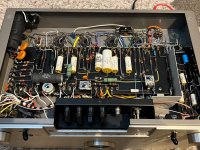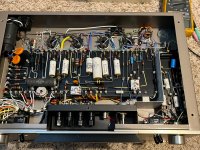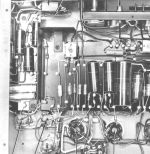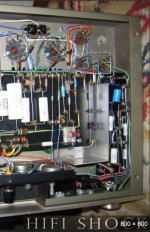I noticed something odd. In the never-used Marantz Model 9, I found a capacitor of unknown value in place of the R23 39K resistor. Everything else in all three Marantz Model 9 amplifiers is identical. The soldering and component positioning are so neat that it appears this modification was done at the factory by VAC.
Otherwise, the Marantz Model 9 units all seem to have the following capacitors: C6 (250µF), C25 (10µF), C29 (20µF), and C30 (20µF). I assume C26, C27, and C28 are the filter capacitors. What is the tiny blue capacitor shown in the attached pictures? The capacitor appears to be attached to a 220K resistor which would be R15 or R95. I assume this electrolytic is C8 0.22uF 400V which is a Mylar capacitor in the service manual. Can someone check me on this?
The writing on the tiny blue electrolytic capacitor is just a code that yields no useful information in a Google search. Unfortunately, I cannot find my Fluke 289 multimeter, which could have measured the capacitor's value.
Additionally, in the two Marantz amplifiers that are in use, someone has definitely replaced the two 100-ohm resistors. However, everything else appears stock, and all resistors measure within their tolerance.
Otherwise, the Marantz Model 9 units all seem to have the following capacitors: C6 (250µF), C25 (10µF), C29 (20µF), and C30 (20µF). I assume C26, C27, and C28 are the filter capacitors. What is the tiny blue capacitor shown in the attached pictures? The capacitor appears to be attached to a 220K resistor which would be R15 or R95. I assume this electrolytic is C8 0.22uF 400V which is a Mylar capacitor in the service manual. Can someone check me on this?
The writing on the tiny blue electrolytic capacitor is just a code that yields no useful information in a Google search. Unfortunately, I cannot find my Fluke 289 multimeter, which could have measured the capacitor's value.
Additionally, in the two Marantz amplifiers that are in use, someone has definitely replaced the two 100-ohm resistors. However, everything else appears stock, and all resistors measure within their tolerance.
Attachments
Last edited:
Must have been running changes. I see variance in the original Model 9's too browsing images online. Also, this is clearly not a mistake, found another reissue online with the same capacitor setup.
Don't really need any additional help then. This was by design and someone else wasn't in there making wild modifications. I'll just need to figure out what's in there or reach out to VAC.
Don't really need any additional help then. This was by design and someone else wasn't in there making wild modifications. I'll just need to figure out what's in there or reach out to VAC.
Attachments
Last edited:
So I have known for quite some time that those blue "capacitors" are actually resistors and they are all per the schematic. First time I have ever seen a resistor look exactly like the small blue capacitors so often found in 80's gear.
You will notice a lot of Vishay/Dale resistors say excellent high frequency characteristics in the data sheets. This means low inductance and should work quite well where there is a carbon composite resistor. The spreadsheet below is Vishay's recommendations for replacing carbon composite.
https://www.vishay.com/docs/31049/carbcompcrossref.pdf
What do you think of me replacing the 150pf Z5U ceramic capacitors that I believe are part of the bias circuit with C0G (NP0)?
You will notice a lot of Vishay/Dale resistors say excellent high frequency characteristics in the data sheets. This means low inductance and should work quite well where there is a carbon composite resistor. The spreadsheet below is Vishay's recommendations for replacing carbon composite.
https://www.vishay.com/docs/31049/carbcompcrossref.pdf
What do you think of me replacing the 150pf Z5U ceramic capacitors that I believe are part of the bias circuit with C0G (NP0)?
I serviced several pairs of Marantz 9s in the past, the ones I worked on all had film capacitors that should not need replacing. Electrolytics are another matter. The units I worked on were not reproductions from VAC.
The power switches in 2 pairs I worked on had shorted to the chassis, recommend original power switches be replaced.
I would make the least number of changes required to keep them working correctly. Well kept pairs can go for $20K or more in some cases
The power switches in 2 pairs I worked on had shorted to the chassis, recommend original power switches be replaced.
I would make the least number of changes required to keep them working correctly. Well kept pairs can go for $20K or more in some cases
Also if possible, keep all the original parts to go with it. The future purchaser may want them.
These are the VAC reissues. Many of the carbon comps are out of spec, I know where I can purchase the comps though should I wish to sell them later. I can always go back in there and put carbon comps back in.
Using Vishay MAL capacitors to replace the bias supply, more expensive but long life capacitors. These sound so good I think I'm going to keep them, selling really isn't on my mind.
I should probably purchase replacement power switches now, what Mouser/Digikey part did you use? Don't want to risk the parts I need being NLA in the future, thx!
Using Vishay MAL capacitors to replace the bias supply, more expensive but long life capacitors. These sound so good I think I'm going to keep them, selling really isn't on my mind.
I should probably purchase replacement power switches now, what Mouser/Digikey part did you use? Don't want to risk the parts I need being NLA in the future, thx!
Last edited:
- Home
- Amplifiers
- Tubes / Valves
- Marantz Model 9 - Restoration resistor choice



